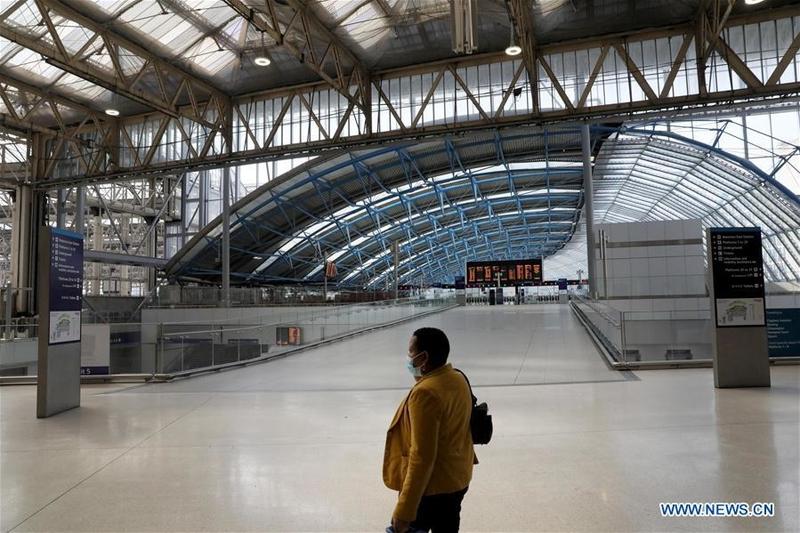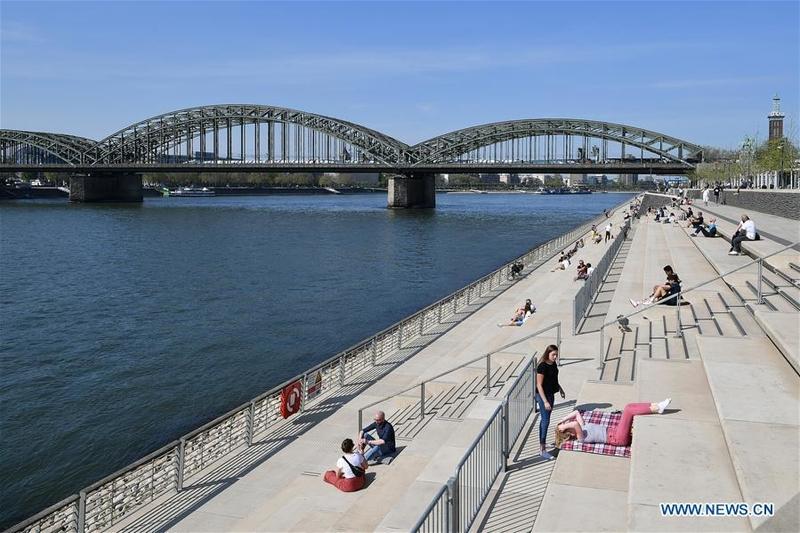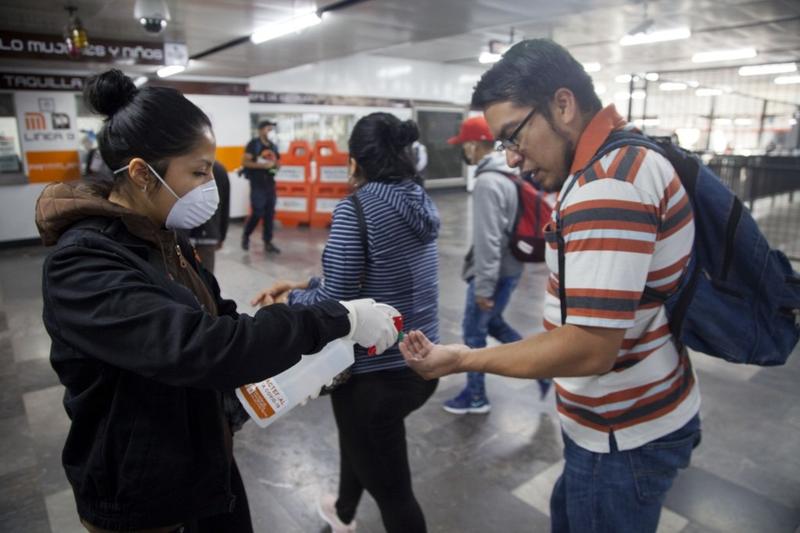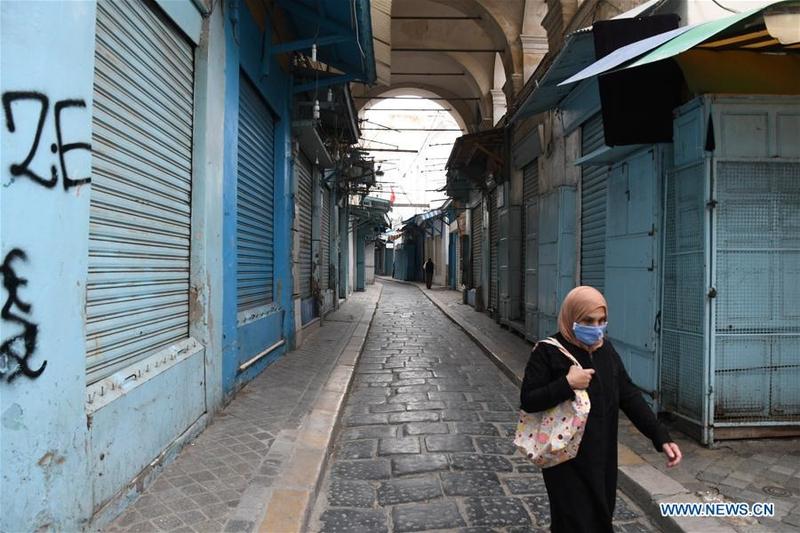 US President Donald Trump speaks to the media in the James Brady Press Briefing Room of the White House, in Washington, April 16, 2020. (ALEX BRANDON / AP)
US President Donald Trump speaks to the media in the James Brady Press Briefing Room of the White House, in Washington, April 16, 2020. (ALEX BRANDON / AP)
WASHINGTON / MOSCOW / BRASILIA / OTTAWA / MEXICO CITY / NAIROBI / ABUJA / NEW YORK / ROME / CAPE TOWN / BERLIN / COPENHAGEN / TIRANA / LISBON / GENEVA / MADRID / VIENNA - US President Donald Trump laid out new guidelines on Thursday for US states to emerge from a coronavirus shutdown in a staggered, three-stage approach meant to revive the US economy even as the country continues to fight the pandemic.
"Our experts say the curve has flattened, and the peak in new cases is behind us. Nationwide more than 850 counties or nearly 30 percent of our country have reported no new cases in the last seven days," Trump said at a White House press conference.
Our experts say the curve has flattened, and the peak in new cases is behind us ... Based on the latest data, our team of experts now agrees that we can begin the next front in our war, which we are calling 'opening up America again' ...
Donald Trump, US president
"Based on the latest data, our team of experts now agrees that we can begin the next front in our war, which we are calling 'opening up America again', and that is what we are doing," Trump said.
The recommendations call on states to show a "downward trajectory" of COVID-19 cases or positive tests for the disease over 14 days before proceeding with the plan, which gradually loosens restrictions on businesses that have been shuttered to blunt the spread of the virus.
"We are not opening all at once, but one careful step at a time," Trump told reporters at the White House.
ALSO READ: Trump: Reopening economy difficult call
Democratic House Speaker Nancy Pelosi said testing was key to opening the country. "The White House's vague and inconsistent document does nothing to make up for the president's failure to listen to the scientists and produce and distribute national rapid testing," she said in a statement.
States that have met the criteria can move into the first phase of re-opening on Friday, Trump said. Some 29 states would be in a position to re-open soon, he said.
The number of COVID-19 cases in the United States topped 660,000 as of Thursday evening with more than 32,000 deaths, according to the Center for Systems Science and Engineering (CSSE) at Johns Hopkins University.
The governors of New York and six other Northeastern states -New Jersey, Connecticut, Pennsylvania, Delaware, Massachusetts and Rhode Island - extended their coronavirus stay-at-home orders to May 15.
Global toll
The global tally of confirmed cases of COVID-19 reported to the World Health Organization (WHO) has exceeded the 2 million mark as of Friday.
According to the latest figures of the WHO Health Emergency Dashboard, updated at 10:00 am CET (0800 GMT), there have been 2,034,477 confirmed COVID-19 cases and 133,873 deaths worldwide reported to WHO.
The United States has reported 632,781 confirmed cases with 28,221 deaths to the United Nations specialized agency, being the hardest hit country.
In Spain and Italy, the second and third worst hit countries, there have been 177,633 and 165,155 cases confirmed respectively, with a death toll of 18,579 and 21,647.
Trailing behind are Germany with 130,450 confirmed cases and 3,569 deaths, and France with 105,155 cases and 17,146 deaths.
 A woman wearing a face mask walks through the empty Waterloo Station in London, Britain, on April 16, 2020. (TIM IRELAND / XINHUA)
A woman wearing a face mask walks through the empty Waterloo Station in London, Britain, on April 16, 2020. (TIM IRELAND / XINHUA)
UK
Britain has expanded the number of people who are eligible to be tested for COVID-19 to include the police, fire service, judiciary and others, health minister Matt Hancock said on Friday, in part of its efforts to widen its testing programme.
The government has been criticised for all but abandoning mass testing in mid-March, but Hancock said it was part of the government’s strategy to have mass testing in the community, something that get closer as Britain builds testing capacity.
The UK is tight on gowns for front line health workers fighting COVID-19 but hopes to get the right equipment where it is needed by the end of this weekend, the minister said on Friday.
Another 847 people who tested positive for COVID-19 died in hospitals in Britain as of Thursday afternoon, bringing the total number of coronavirus-related deaths to 14,576, the Department of Health and Social Care said Friday.
As of Friday morning, 108,692 people tested positive for the virus, marking a daily increase of 5,599, said the department.
The British government on Thursday extended the current lockdown measures for "at least three weeks" in a bid to contain the spread of the virus.
Asserting that relaxing lockdown measures would lead to a resurgence of the virus, Dominic Raab, the foreign secretary and first secretary of state, said the government has decided relaxing the measures would make the economic impact worse, not better.
The British government was too slow to react on a number of fronts to the novel coronavirus outbreak that could cause the deaths of 40,000 people in the United Kingdom, a leading public health professor told lawmakers on Friday.
Italy
Deaths from the COVID-19 epidemic in Italy increased by 525 on Thursday, down from 578 the day before, but the number of new cases accelerated sharply to 3,786 from a previous 2,667.
The daily death toll was the lowest since Sunday, while the tally of new infections was the highest since Sunday.
The total death toll rose to 22,170, the Civil Protection Agency said, while the number of officially confirmed cases climbed to 168,941.
President of the National Institute of Health Silvio Brusaferro said, "as we have seen over the past few days, we are in a descending trend" in terms of the epidemiological curve.
"At this time we are estimating that over 90 percent of Italians have not come in contact with the virus, which means they are susceptible to infection," Brusaferro also said.
"This means that as soon as we stop being extremely careful, as soon as we are less than precise in adopting the recommendations, the virus could start circulating again in a more intense way."
Italy plans to use a smartphone app developed by tech start-up Bending Spoons to track people who test positive for the coronavirus as part of efforts to lift its nationwide lockdown.
Arcuri said the aim is to make the app available to the entire country after the regional testing.
France
France’s state-supported tracing app project “StopCovid” will not be ready when parliament debates it on April 28-29, the minister for digital affairs Cedric O said on Friday.
The smartphone app, aimed at warning users if they came into contact with a coronavirus carrier, has raised questions about the impact of tracing technology on civil liberties.
France's registered death toll from coronavirus infections rose towards 18,000 on Thursday, but some data suggested the spread of the disease has been contained after a one-month old national lockdown, officials said.
During a press conference Jerome Salomon, head of the public health authority, said the number of people in hospital had declined for a second day running, and that the total number in intensive care units had fallen for the eighth day in a row.
"The decline in intensive care needs is consolidating, but 6,248 patients in ICU units is a much higher figure than the initial maximum capacity in these units in France," Salomon said.
That number was however at its lowest since April 1 and is down by almost 1,000 from its April 8 peak of 7,148.
At 17,920, the number of fatalities is up 4.4 percent over 24 hours, with the rate of increase decelerating again after speeding up in the two previous days.
The rate of increase in confirmed coronavirus cases in France remained steady at 2.5 percent, with 108,847 cases. In nursing homes however, probable cases shot up by 36 percent, reaching 37,213.
That took the total number of confirmed and possible cases to 146,606.
 People sit far away from one another on the bank of the Rhine river in Cologne, Germany, April 16, 2020. (ULRICH HUFNAGEL / XINHUA)
People sit far away from one another on the bank of the Rhine river in Cologne, Germany, April 16, 2020. (ULRICH HUFNAGEL / XINHUA)
Germany
The coronavirus outbreak in Germany has become manageable again as the number of patients who have made a recovery has been higher than the number of new infections every day this week, Health Minister Jens Spahn said on Friday.
Spahn also said a coronavirus contact tracing app will be ready for Germans to download and use on their smartphones in three to four weeks.
German federal and state government leaders said on Wednesday they would support voluntary use of a contact tracing app, when available, so people can quickly learn when they have had been exposed to an infected person.
Germany's confirmed coronavirus cases have risen by 3,380 to 133,830, data from the Robert Koch Institute (RKI) for infectious diseases showed on Friday, marking a third straight day of new infections acclerating.
The reported death toll has risen by 299 to 3,868, the tally showed.
The federal Minister of Labor Hubertus Heil said on Thursday that the German government has adopted uniform nationwide health and safety standards for protection against COVID-19 infection at work.
Spain
The number of confirmed cases of the coronavirus in Spain rose to 188,068 on Friday, the country's head of health emergencies Fernando Simon said at a news conference.
Health authorities identified 5,252 new cases of the virus between Thursday and Friday, which represents a 2.9 percent increase.
Social Security Minister Jose Luis Escriva said Spain was planning to pay a basic monthly income to about a million of the country's poorest households to help them weather the impact of the coronavirus outbreak.
Denmark
Denmark will allow certain small businesses, such as hairdressers, beauty salons and driving schools, to reopen on April 20, the government said on Friday, following a lockdown ordered last month to rein in the coronavirus.
The move comes after the Nordic country, one of Europe's first to shut down, began reopening day care centres and schools this week in a first step towards gradually easing the lockdown.
Denmark will keep its borders shut, however, while curbs on restaurants, bars and gyms remain in place, as does a ban on large public gatherings.
The number of confirmed COVID-19 cases in Denmark has risen to 7,073, while the death toll is 336, according to the latest figures from the SSI on Friday.
Russia
Russia has registered a daily record of 4,070 COVID-19 cases over the last 24 hours, with the total number reaching 32,008 as of Friday, official data showed.
The death toll climbed to 273 from 232 the previous day, while 2,590 people have recovered, including 286 in the last 24 hours, Russia's coronavirus response center said in a statement.
Moscow, the worst-hit city across the country, confirmed 1,959 new cases over the last 24 hours, reporting 18,105 cases so far.
The peak of infections in Moscow is expected to occur in the next two or three weeks, the city's deputy mayor Anastasia Rakova said in a video address to medical workers.
President Vladimir Putin, citing the deepening coronavirus crisis, said on Thursday the country would postpone its May 9 celebrations including a huge military parade across Red Square to mark 75 years since the Soviet victory in World War II.
READ MORE: WHO: Europe virus cases almost 1m, coming weeks 'critical'
Portugal
Portugal has extended for the second time its state of emergency by two weeks to fight the COVID-19 pandemic. Yet the country expected a transition from the restrictions to normal economic and social activities in May.
President Marcelo Rebelo de Sousa on Thursday declared in a televised national speech another 15-day extension of the State of Emergency until May 2, which had been approved by the Portuguese parliament earlier in the day.
In his speech, the Portuguese president expressed hope that the economy and society will be reactivated gradually next month.
To date, Portugal has reported 18,841 cases and 629 deaths from COVID-19, according to the latest data from the health authorities.
Belgium
Belgium has recorded 5,163 deaths since the start of the coronavirus epidemic as of Friday, Belgian health authorities said.
Austria
Austrian museums and some other cultural spaces will be allowed to reopen from mid-May as part of the country's step-by-step loosening of its coronavirus lockdown, Austrian Vice Chancellor Werner Kogler said on Friday.
A specific date has not yet been set, Kogler said at a news conference, adding that large events involving many people close together, such as festivals, would remain banned until Aug 31.
Brazil
The number of confirmed COVID-19 cases in Brazil rose from 28,320 to 30,425, the Health Ministry said on Thursday.
The death toll increased from 1,736 to 1,924, the ministry said.
After the latest numbers were released, Brazil's Minister of Health Luiz Henrique Mandetta said that President Jair Bolsonaro has removed him from the post due to their differences on when to lift lockdown measures and reactivate the economy.
READ MORE: Bolsonaro fires Brazil's health minister, wants curbs lifted
Canada
Canada's border restrictions with the United States will remain in place "for a significant amount of time" as the two countries fight the coronavirus outbreak, Prime Minister Justin Trudeau said on Thursday.
A total of 1,193 people in Canada had died from the coronavirus by 7 pm (2300 GMT) on Thursday, data posted by the public health agency showed.
The total number of confirmed cases climbed to 30,092.
Medical officials expect the death toll to be between 1,200 and 1,620 by next Tuesday, Theresa Tam, the chief public health officer, said at a briefing.
Meanwhile, Trudeau said Ottawa would expand loans to firms that paid between C$20,000 and C$1.5 million in total payroll in 2019, and planned to help commercial property owners cut or forgive rent to small businesses.
 An employee sprays hand sanitizer into the palm of a commuter's hand at a subway station in Mexico City, April 16, 2020. (CLAUDIO CRUZ / AFP)
An employee sprays hand sanitizer into the palm of a commuter's hand at a subway station in Mexico City, April 16, 2020. (CLAUDIO CRUZ / AFP)
Mexico
Mexican Deputy Health Minister Hugo Lopez-Gatell said on Thursday that the country might have as many as 55,951 people infected with the coronavirus, twice the estimated number reported last week.
Mexican health officials reported 450 new cases of the coronavirus and 37 more deaths, bringing the country's total to 6,297 confirmed cases and 486 deaths.
Citing government models, Lopez-Gatell has said many who are infected likely did not have symptoms or were not diagnosed.
Mexico's government on Thursday announced it will extend a nationwide lockdown until May 30.
President Andres Manuel Lopez Obrador said that the country was looking to return to normal beginning June 1, with schools and businesses reopening provided people comply with anti-coronavirus health measures until then.
The president said things can go back to normal on May 17 in areas with low coronavirus infection rates, though restrictions would continue for the elderly, pregnant women and people with illnesses such as diabetes.
Lopez Obrador also announced an additional 1 million loans would be made available to small businesses and said government spending to stimulate the economy would be concentrated to the months of May and June.
Switzerland
Switzerland’s government on Friday urged residents against complacency, saying they must keep their guard up even as the country’s new coronavirus infection rate slows and lawmakers start relaxing restrictions to stem the disease’s spread.
In light of its flattening coronavirus curve, Switzerland has decided to relax the coronavirus measures in three phases starting on April 27, President of the Swiss Confederation Simonetta Sommaruga said on Thursday.
The first phase will begin on April 27, when hairdressing salons, massage practices, tattoo shops, cosmetic studios, flower shops and garden centers will be allowed to reopen.
The second phase is expected to start on May 11, when school courses will resume, and shops and markets will reopen -if conditions allow, said Sommaruga.
If the measures in the first two phases are effective, upper secondary schools, vocational schools and universities will resume face-to-face teaching on June 8. Museums, zoos and libraries will be reopened, and restrictions on gatherings may also be relaxed, according to a press release.
Separately, the government said that Switzerland will fine shoppers who ignore coronavirus-related border restrictions in their hunt for good deals in neighboring countries.
The Swiss death toll from the new coronavirus has reached 1,059 people, the country’s public health agency said on Friday, rising from 1,017 on Thursday.
The number of people showing positive tests for the COVID-19 disease caused by the virus increased to 27,078 from 26,732.
Kenya
Kenyan President Uhuru Kenyatta on Thursday confirmed nine new cases of COVID-19, bringing the tally to 234.
Kenyatta said that medical personnel had in the past 24 hours tested 704 samples, out of which one more patient had succumbed to the virus, raising the death toll to 11.
Kenyatta said that medical personnel have received additional testing reagents and have so far tested over 10,000 persons.
Meanwhile, a Catholic priest was charged in Kenyan court on Thursday with spreading the coronavirus, the second person to face such charges in Kenya, after authorities said he failed to adhere to quarantine rules following a visit to Italy.
Nigeria
Nigeria's COVID-19 cases rose to 442 after 35 more cases were confirmed, the Nigeria Center for Disease Control (NCDC) said Thursday.
One more death was reported late Thursday in Nigeria, taking the toll to 13, according to health authorities.
South Africa
South Africa's COVID-19 deaths rose by 14 in 24 hours as 99 more people were infected, Health Minister Zweli Mkhize said on Thursday.
"It is with regret that we inform the public that the COVID-19 related deaths is now 48," Mkhize said in his latest update on the pandemic.
Two provinces - Limpopo and the Eastern Cape - have recorded their first deaths, he said.
The total number of COVID-19 cases in the country has reached 2,605, the minister said.
Meanwhile, mines will be allowed to operate at up to 50 percent capacity during a nationwide lockdown to curb the spread of the new coronavirus, according to amended regulations published on Thursday.
READ MORE: Africa strives to navigate challenges as cases exceed 10,000
Uganda
The Ugandan Ministry of Health on Thursday discharged eight more patients who have recovered from COVID-19 after treatment, bringing the number of recoveries in the country to 20.
"All the discharged patients tested negative twice for COVID-19. We are now remaining with 35 active cases from the confirmed 55 cases in the country," said Emmanuel Ainebyoona, spokesperson for the ministry
The country has registered 54 confirmed cases and is currently under a three-week extended nationwide lockdown aimed at stopping the spread of the virus.
Libya
The Libyan National Center for Disease Control on Friday announced one new COVID-19 case, bringing the tally in the country to 49 with 11 recoveries and one death.
Libyans rushed on Thursday to stock up on food for the holy Muslim month of Ramadan before a curfew starts in the capital Tripoli and other western areas aimed at curbing the spread of the coronavirus.
To combat its spread, the internationally-recognized Government of National Accord (GNA) imposed a 24-hour curfew from Friday to try to ease the pressure on the healthcare system in the areas it controls. Only bread and food purchases are allowed in the morning.
Albania
Albania amended its penal code on Thursday to punish anyone breaking coronavirus quarantine and self-isolation rules and infecting others with up to eight years in jail as it slowly prepares to restart sections of its economy.
Critics of the tougher measure said fines were proving effective but Prime Minister Edi Rama defended the new penalty as necessary for successfully relaxing the lockdown.
Rama said the government believed about 2,800 people would have died if lockdown rules had not been imposed. As of Thursday, 26 people have died and 518 have been infected with the new coronavirus among Albania's 2.8 million people.
Slovenia
Slovenia will from Monday ease restrictions that have been imposed since the middle of March to contain the spread of the coronavirus, the government said late on Thursday.
Slovenia has so far confirmed 1,268 coronavirus cases and 61 people have died. Wednesday was the first day since March 29 with no coronavirus-related deaths reported.
According to a government statement, most shops, including those selling furniture, cars, bicycles and construction material as well as car service centres will be opened from April 20. Hairdressers, beauty parlours and pet grooming centres will open on May 4, the government said.
Schools, kindergartens, universities, libraries and cultural institutions remain closed, while public transport continues to be suspended.
Peru
Peru on Thursday said a total of 12,491 people have tested positive for the COVID-19, and 274 people have died of the disease.
In the past 24 hours, hospitals reported 1,016 new cases of infection, the Health Ministry said.
Peru's capital Lima is the epicenter of the outbreak, registering 9,107 of the cases.
Ecuador
Ecuador is seeing a "stabilization" in the curve of the mortality rate of the COVID-19, even in the epicenter of the national outbreak, the southwest province of Guayas, a health official said on Thursday.
The death toll stands at 403, with a total of 8,225 people testing positive for the virus, most of them in Guayas.
Romania
The Romanian parliament voted on Thursday to approve an extension of the current state of emergency for another 30 days to May 14.
The latest official data released on Thursday showed that 491 new cases have been registered in the past 24 hours, bringing the country's total to 7,707.
So far, 392 people have died, while 1,357 people have recovered.
Poland
Poles will have to cover their noses and mouths in public until a coronavirus vaccine is found, the health minister said on Thursday, as the government eased a few of the restrictions that have brought daily life to a virtual standstill.
Prime Minister Mateusz Morawiecki said Poland would start easing some coronavirus restrictions from April 20.
Meanwhile, Poland's borders will remain closed until at least May 3, Morawiecki said.
The number of infections and deaths in Poland has risen to 7,918 and 314 respectively.
 Shops are closed in the Medina of Tunis (old city of Tunis) to prevent the outbreak of the COVID-19, in Tunisia, April 16, 2020. (ADELE ZZINE / XINHUA)
Shops are closed in the Medina of Tunis (old city of Tunis) to prevent the outbreak of the COVID-19, in Tunisia, April 16, 2020. (ADELE ZZINE / XINHUA)
Tunisia
Tunisia's total cases of COVID-19 reached 822 after 42 new cases were detected during the past 24 hours, Tunisian Ministry of Health said Thursday.
"Following a total of 793 lab tests, 72 cases tested positive, of which 42 were new cases and 30 were previously confirmed cases who were still infected with this virus," said the ministry in a statement.
The ministry added that 37 deaths from the coronavirus were reported in 13 out of 24 provinces in the country.
Algeria
Algerian health authorities on Thursday said 12 more deaths from the coronavirus and 108 new infections have been reported in the last 24 hours.
The death toll of COVID-19 in the country hit 336, said Djamel Fourar, head of the COVID-19 Detection and Follow-up Commission.
He added that the total infections rose to 2,268 and 783 patients have recovered.
Egypt
The Egyptian Health Ministry confirmed on Thursday 168 new cases of COVID-19, bringing the total number of confirmed cases in the country to 2,673.
Thirteen more deaths were recorded, raising the death toll in Egypt to 196, said the ministry's spokesman Khaled Megahed in a statement.
Egyptian Prime Minister Mostafa Madbouly said that the government will halt all public means of transport and close public parks next Monday, a traditional Egyptian festival known as Sham el-Nessim (breathing the breeze).
Morocco
A total of 259 new COVID-19 cases were reported in Morocco on Thursday, bringing the total number of confirmed cases to 2,283, the Health Ministry said.
This is the highest number of new cases registered in one day since the outbreak of the pandemic in the North African country started on March 2.
The death toll stands at 130, while the number of cured cases is now at 249, the ministry said.
Mali
Mali's Ministry of Health and Social Affairs reported on Thursday 23 new cases of COVID-19 in the country, bring the total number of confirmed cases to 171.
So far, Mali has reported 171 cases of COVID-19, including 13 deaths and 34 cured patients.
The second round of Mali's legislative elections will take place as scheduled on April 19 despite the increasing number of COVID-19 across the country
Argentina
Argentina's capital Buenos Aires on Thursday installed its first network of infrared cameras to help contain the spread of the coronavirus outbreak.
Also known as thermographic cameras, the devices can detect from a distance whether a person is suffering from fever, one of the main symptoms caused by the virus.
The cameras were installed at the entrance to a major public transit terminal in the south of the city, Constitucion Station, where commuters can switch between the subway, train system and bus service.
Argentina has reported 2,571 cases of COVID-19 infection, 648 of them in Buenos Aires.
Sweden
Sweden will extend restrictions on international travel until May 15, Prime Minister Stefan Lofven announced on Thursday.
Lofven added that it may take months before Sweden lift other restrictions put in place to stem the spread of the coronavirus.
The Public Health Agency said the total number of confirmed cases in the country was 12,540. Out of those, 1,333 have died and 996 have been treated in intensive care.
North Macedonia
North Macedonia will deploy more army troops nationwide to assist police forces and local authorities in the implementation of measures against COVID-19, Minister of Defense Radmila Shekerinska said Thursday.
The Health Ministry reported 107 new COVID-19 cases in the past 24 hours, bringing the country's total to 1,081 with 121 recoveries and 46 fatalities.
Georgia
Georgia has banned the movement of all private vehicles from Friday until April 21, tightening a state of emergency in an effort to prevent spread of the coronavirus, the government said on Thursday.
The Causacus republic of 3.7 million people has reported 348 cases of COVID-19 and three deaths as of Thursday.
Ukraine
Ukraine's Health Ministry reported on Friday that 501 people have tested positive for the novel coronavirus in the country over the last 24 hours, bringing its total tally to 4,662.
As of Friday, Ukraine's COVID-19 fatalities reached 125, while 246 patients have recovered.
Netherlands
The number of confirmed COVID-19 cases in the Netherlands has increased by 1,235 over the past 24 hours to 30,449 as of Friday, according to data from the National Institute for Public Health and the Environment.
Zambia
Zambia on Friday reported four new COVID-19 cases, bringing the total to 52.
A total of 188 tests were conducted in the last 24 hours, Minister of Health Chitalu Chilufya said.
Most of the new cases were local contacts of previous confirmed cases.
Tanzania
Tanzanian health authorities said 53 new confirmed cases of COVID-19 were recorded on Thursday and Friday bringing to 147 the total number of cases in the east African nation.
Ummy Mwalimu, the Minister of Health, Community Development, Gender, Elderly and Children, said in a statement that all the new cases were Tanzanians.


